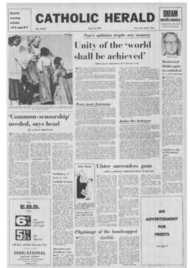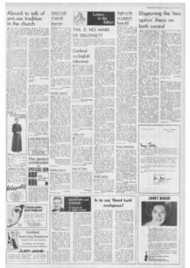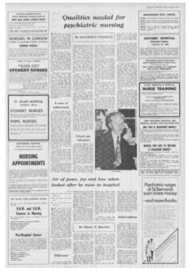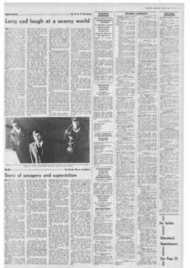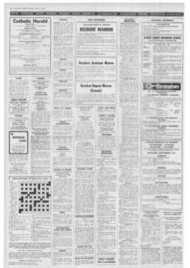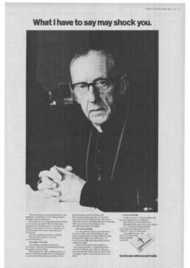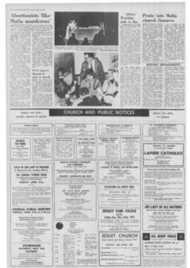Page 8, 16th April 1971
Page 8

Report an error
Noticed an error on this page?If you've noticed an error in this article please click here to report it.
Tags
Share
Related articles
Belmont And
New Downside
Cardinal Goes To Downside Dinner
Admirable Guide To A Self-renewing T Reasury
How Church In China Died Of Cruelty
Unique contribution to Old Testament bibliography
by Dom WILFRED PASSMORE, O.S.B. Abbot of Downside
The Bible by Erich Lessing and others (Macmillan £16) THIS pictorial narration by Erich Lessing. under the title "The Lord said to Abram", with 115 colour photographs of outstanding excellence and relevance, is a unique contribution to Old Testament bibliography, bringing a new light and a vivid reality to the history of the Jewish nation from the call of Abraham to the final battle and end of the ancient Jewish nation after the suppression of the revolt of Bar Kechba under the Emperor Hadrian in A.D.134.
Although the text of this work is not of a highly specialised character, and the inevitably high cost of production will limit its circulation, it is nevertheless a book which every library should possess. It cannot fail to stimulate interest and strengthen the sense of reality of those who have only perhaps an average knowledge of the Old Testament, and to encourage deeper study.
In a foreword by David Ben-Gurion we are reminded of the great debt all nations have to the ancient Jewish Nation for their beliefs and moral codes which have emerged from the sacred writings. It is from the Jews that belief in the one and only God has imprinted itself on the Nations.
The idea of universal brotherhood is laid down in the Book of Genesis: "You must treat the proselyte who resides with you like the native born among you, and have him as one of your own, since I am the Lord your God. For you were aliens yourself in the land of Egypt". And in the twentieth century "Israel has come back to life through a long continuing process which has never ceased since the destruction of the Temple."
In his introduction Erich Lessing, for whom no praise is too great for the magnificent photographs, emphasises that all that befell the Jews was part of their encounter with God, and that everything comes from him. It is this conviction which has supported all developments of Jewish theology and sustained God's chosen people after the destruction of the Temple and of the Jewish State and the Diaspora. The point is well made that the Jews were "victims not makers of history" and that the laws by which the Jewish State had
been governed should be binding for a stateless Jewry.
Finally he reminds us that the Bible "is not hagiography but a reflection of real life" and that in the stories of the Old Testament, "archetypal of human adventure and suffering", God is always involved. The importance of biblical archaeology has become more and more apparent during the last hundred years, and the sites of biblical incidents are now reproduced in many cases unchanged by time.
Professor Westerman in his article on "The Old Testament" reminds us that its Books are sacred scriptures for Christian Church as well as for the Jewish Synagogue. It is the national and historical book of the modern State of Israel. His comments on the Creation, the Exodus, the danger of idolatry. the nature and influence of the Canaanite gods are valuable insights into old problems.
He describes the charismatic leadership of the Judges as "political power without its being stabilised in an Institution. It was an exercise of power which went hand in hand with the greatest possible degree of liberty", and critical voices were never absent during the monarchy. The pleas of the Prophets, the worship in the Temple and the offering of sacrifices "all testify to the great longing for the removal of guilt and the forgiveness of sins". His section on postexilic Judaism and the apocalyptic character of its writings is especially good.
Dr. Wurtheim writes clearly on the texts of the Bible, noting the importance of the Biblia Hebraica Stuttgartensis from the eleventh century manuscripts in the Leningrad Library, and the related value of the Dead Sea Scrolls. Whilst pointing out the defects of the Septuagint he writes that one must not "miss its immense importance in the history of the human spirit. One of its great contributions was assistance in forming the vocabulary of Christian theology. No study of the theological concepts of the New Testament is complete without detailed attention to the Septuagint."
After the return from Babylon the conflict with Greek civilisation became acute with the importation of gods and their temples. The Wailing Wall "today symbolises the Temple itself in the Messianic expectation of the restoration of the Davidic Kingship'. Its importance to contemporary Jewry cannot be overstressed.
blog comments powered by Disqus


